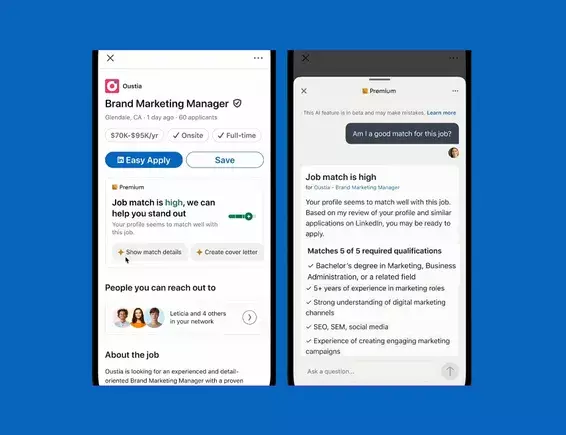In an age where technology continuously reshapes our professional landscapes, LinkedIn is stepping up with innovative tools tailored for job seekers. The introduction of the “Job Match” feature, alongside a recruitment AI agent, presents a promising evolution in the hiring process. As the competition for jobs intensifies, these advancements aim to empower candidates by enhancing their engagement with prospective employers through data-driven insights.
The Evolution of Job Matching
With the Job Match tool, LinkedIn is now revolutionizing how individuals approach job applications. At its core, the function gauges how well a user’s skills correlate with job requirements specified in listings. When job seekers peruse available positions on the platform, the AI quickly assesses their profiles against the listed qualifications, providing an instant match summary. This feature serves a dual purpose: not only does it highlight relevant skills, but it also offers actionable advice to amplify the chances of landing an interview.
This breakthrough means candidates are no longer sending blind applications into the abyss. Instead, they receive personalized feedback on how they measure up, which qualifications are worth emphasizing, and how they could enhance their profiles further—be it through recommended courses or insightful tips for crafting a standout cover letter. This tailored approach aids in directing job seekers toward roles that genuinely fit their expertise, thereby increasing the likelihood of successful outcomes.
For LinkedIn Premium subscribers, the benefits extend even further. In addition to the basic Job Match tools, they gain access to analytical insights that compare them against other applicants for the same roles. This level of scrutiny allows users to understand their standing within the applicant pool, as well as receive ratings categorizing them as high, medium, or low matches. Such clarity can significantly bolster confidence and strategically guide their job search, as they are informed about their alignment with job requirements.
Furthermore, Premium users can take advantage of advanced AI tools aimed at refining resumes and cover letters, propelling them toward success. This encompasses not just a broader view of their applications but also tailored recommendations that make their profiles stand out among thousands. In a competitive job market, these distinctions can make or break a candidate’s chances.
Simultaneously, LinkedIn is broadening its focus not only on job seekers but also on those who hire, particularly small and medium-sized businesses (SMBs). The recruitment AI agent designed for these businesses simplifies the often daunting process of hiring. With a user-friendly, point-and-click interface, employers can quickly post jobs, interact with candidates, and manage applications more effectively.
This tool is crucial for SMBs that may lack the resources for a dedicated recruitment team. With the introduction of the AI recruitment agent, LinkedIn is responding to the significant demand from the 2.5 million SMBs that already use the platform for talent acquisition. By streamlining this process, LinkedIn aids these organizations in finding the right talent without overwhelming administrative burdens.
LinkedIn’s innovative tools align with its broader vision of entering an “agentic era”—a tech-driven age where AI influences various daily business interactions. With a growing reliance on intelligence tools customized to individual needs, LinkedIn’s offerings are undoubtedly a step in this direction.
By facilitating a more personalized and efficient job search process, the platform empowers candidates while simultaneously equipping businesses with sophisticated resources for hiring. As these features roll out globally, their effectiveness will likely set a new standard for recruitment practices across industries.
LinkedIn’s early 2025 strategy marks a significant leap in utilizing AI to bridge the gap between job seekers and employers. As professionals adapt to these refinements, the ultimate takeaway is clear: the future of job hunting is not just about applying but strategically enhancing the candidate experience through intelligent data insights. This evolution is set to reshape the dynamics of recruitment, benefiting all parties involved in the hiring process.


Leave a Reply